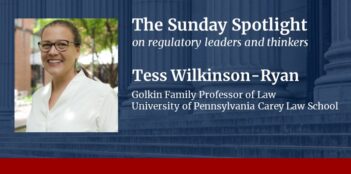
Scholars offer recommendations for expanding public access to agencies’ legal documents.
The law requires agencies to post some of their legal materials online and to disclose other materials if a member of the public requests them. But should the public have access to all agency law without ever having to make a request?
The answer is “yes,” according to a forthcoming article by Bernard Bell, Cary Coglianese, Margaret Kwoka, Michael Herz, and Orly Lobel. This team of law professors recommends legislative reforms to expand agencies’ affirmative disclosures of legal documents to the public. Their recommendations stem from a year-long study and a resulting 150-page report that they completed at the request of the Administrative Conference of the United States.
Bell and his collaborators distill the findings of their project into one principle: “All legal materials that agencies are obligated to disclose upon request by a member of the public should be affirmatively made accessible to the public on agency websites.” They then offer a series of recommendations to Congress for ensuring that agencies better fulfill this principle.
They define agency legal materials to include all documents focused on the legal rights and obligations of members of the public, as well as any materials articulating legal constraints imposed upon agencies themselves. Because these materials make up the law that comes from agencies, Bell and his colleagues argue that they are among the types of agency documents that should be most readily accessible to the public.
They divide their series of recommendations to Congress into three parts.
The first set of recommendations addresses exactly what kinds of legal materials Congress should require agencies to disclose. These recommendations call on Congress to amend the Freedom of Information Act to require affirmative disclosure of documents that are currently accessible to the public only by request. These documents include final opinions and orders, written enforcement decisions, and interagency memoranda of understanding. Bell and his collaborators also recommend that Congress amend parts of the E-Government Act, the Federal Register Act, and the Presidential Records Act to promote disclosure of various other legal materials.
If Congress follows these recommendations and requires agencies to disclose additional categories of documents than they already do, agencies could be faced with increased burdens. For example, agencies may have to process voluminous sets of legal materials and then post them online.
To address this concern, Bell and his collaborators recommend Congress adopt a provision authorizing agencies, under limited conditions, to use notice-and-comment rulemaking to exempt themselves from their affirmative disclosure obligations. The law professors explain that such an exemption would be justified when disclosure would be impracticable to the agency and of trivial value to the public. They emphasize that undergoing notice and comment is important because the public should participate in a decision that will impact their access to materials about agency law.
In a second set of recommendations, Bell and his colleagues also address in their forthcoming article exactly how agencies should disclose their legal materials. They argue that new legislation should enable each agency to customize its procedures and practices. But in doing so, Congress should direct agencies to develop detailed affirmative disclosure plans, which themselves would be available to the public. Bell and his coauthors provide eleven key elements of such plans, including clear descriptions of the types of legal materials the agency plans to disclose and listings of the locations on an agency’s website where the public can find these materials.
In a third set of recommendations, Bell and his colleagues offer a series of ideas for strengthening agencies’ incentives to disclose their legal materials. They recommend that Congress explicitly make agencies’ affirmative disclosure provisions enforceable by private lawsuits. In addition, Bell and his colleagues suggest that whenever a member of the public seeks specific legal materials that an agency should have affirmatively disclosed, but has not, the agency should provide the materials to the requester on an expedited basis and without fees.
By allowing for judicial enforcement of affirmative disclosure requirements and requiring agencies to provide requested materials quickly and free of charge, agencies would be encouraged to be vigilant about disclosing all their legal materials on a proactive basis, argue Bell and his colleagues.
They contend that their three sets of recommendations merely call upon Congress to direct agencies to engage in disclosure practices that have already proven feasible, because almost all of them have some prior precedent in some federal agencies’ current practices. Bell and his colleagues argue that, like all law, legal materials produced by agencies are of significant importance to the public. The public should therefore not need to request such materials from the agency, but should have easy, online access to them at any time.



